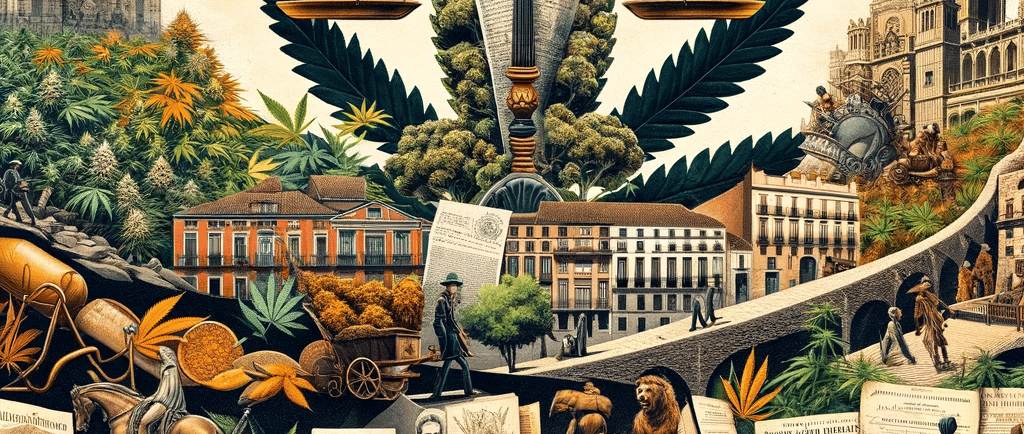The Evolution of Cannabis Laws in Spain
Cannabis has a multifaceted history in Spain, mirroring the plant's complex relationship with societies globally. Tracing its journey from an unremarkable agricultural crop to a subject of legal and cultural contention, the story of cannabis in Spain is not just about a plant but about shifting social, political, and legal paradigms. This article explores the evolution of cannabis laws in Spain, shedding light on the myriad influences that have shaped its current legal status and societal perception.
CANNABIS GUIDE
12/3/20233 min read


The Evolution of Cannabis Laws in Spain
Historical Context
Cannabis arrived in Spain several centuries ago, with its initial uses rooted in the realms of medicine and industry. Historical records suggest that it was employed for its analgesic and sedative properties, while hemp, a variety of cannabis, was valued for its fiber. This utilitarian view of cannabis persisted until the early 20th century, when global attitudes towards narcotics began to shift.
Early Regulations and International Influence
The early 20th century marked the beginning of a new era in the regulation of cannabis in Spain. The country's participation in international conventions, starting with the International Opium Convention of 1925, signaled its commitment to a global effort to control narcotics, including cannabis. These international treaties laid the groundwork for the nation's drug policies, influencing the legal framework that governed cannabis.
Franco Era: Stringent Drug Laws
The period of Franco's dictatorship was characterized by stringent laws against drugs, including cannabis. The regime's conservative stance on narcotics was part of a broader agenda to control and suppress what was deemed socially and morally undesirable. Cannabis use and trafficking were heavily penalized, reflecting the era's harsh approach to drug control.
Post-Franco Liberalization and Decriminalization
Following Franco's death in 1975, Spain embarked on a path of liberalization, significantly impacting its drug policies. In the late 20th century, the country decriminalized the personal use and possession of small amounts of cannabis. This shift distinguished personal consumption from trafficking, a move that was both pragmatic and reflective of changing societal attitudes towards cannabis.
Rise and Regulation of Cannabis Clubs
The early 2000s witnessed the emergence of a unique phenomenon in Spain's cannabis landscape: the cannabis clubs. These clubs, which distribute cannabis among their members in a non-profit model, occupy a legal grey area. They are neither fully legal nor outright illegal, operating based on interpretations of the laws concerning personal use and collective cultivation. The regional variations in how these clubs are regulated highlight the complexity and inconsistency of cannabis laws across Spain.
Cannabis Clubs: A Closer Look
These clubs operate on the principle of closed-circuit distribution among adult members. They are intended to provide a safe and regulated environment for cannabis consumption, distancing their members from the illegal market. The rise of these clubs has prompted a series of legal challenges and debates, reflecting the ongoing struggle to define the legal status of cannabis in Spain.
Comparative Analysis with European Cannabis Laws
Spain's approach to cannabis stands in contrast to the policies of other European countries. While the Netherlands has famously legalized cannabis, and countries like Portugal have decriminalized all drugs, Spain's model, particularly the cannabis clubs, is relatively unique. This comparative perspective underscores the diversity in drug policy approaches across Europe.
Impact on Society and Industry
The changing legal landscape of cannabis in Spain has had significant implications for society and the cannabis industry. The partial tolerance of cannabis, exemplified by the clubs, has created a unique market and cultural phenomenon. This quasi-legal status has spurred discussions on public health, safety, and the potential benefits of a fully regulated market. The economic implications, including potential tax revenues and job creation, are also noteworthy aspects of this evolving scenario.
The Economic Perspective
The cannabis industry, albeit operating in a legal grey area, contributes to the economy in various ways. Cannabis clubs have become a source of employment and have spurred ancillary businesses, from paraphernalia to consultancy services. The potential for tax revenue from a regulated cannabis market is a point of consideration for proponents of legalization.
Current Debates and Future Prospects
The debate over the future of cannabis laws in Spain is multifaceted. Advocates of full legalization argue that it would bring economic benefits, reduce the burden on the legal system, and provide safer options for consumers. Opponents, however, raise concerns about public health, addiction, and the social implications of widespread cannabis availability. The possibility of Spain moving towards a model of full legalization or a more regulated version of the current system is a subject of ongoing debate.
Cannabis and Public Health
Public health considerations play a significant role in the cannabis legalization debate. Concerns about the potential for increased addiction rates, impacts on mental health, and the effects of cannabis on young people are central to the arguments against legalization. Proponents, however, point to the potential medical benefits of cannabis, arguing for regulated access to ensure quality and safety.
Conclusion
The evolution of cannabis laws in Spain reflects a journey from stringent control to a more nuanced, albeit still ambiguous, approach. As Spain continues to navigate this complex legal and social terrain, the future of cannabis laws remains an open question. What is clear, however, is that the plant's role in Spanish society has evolved from a mere agricultural commodity to a symbol of broader societal shifts and debates.
